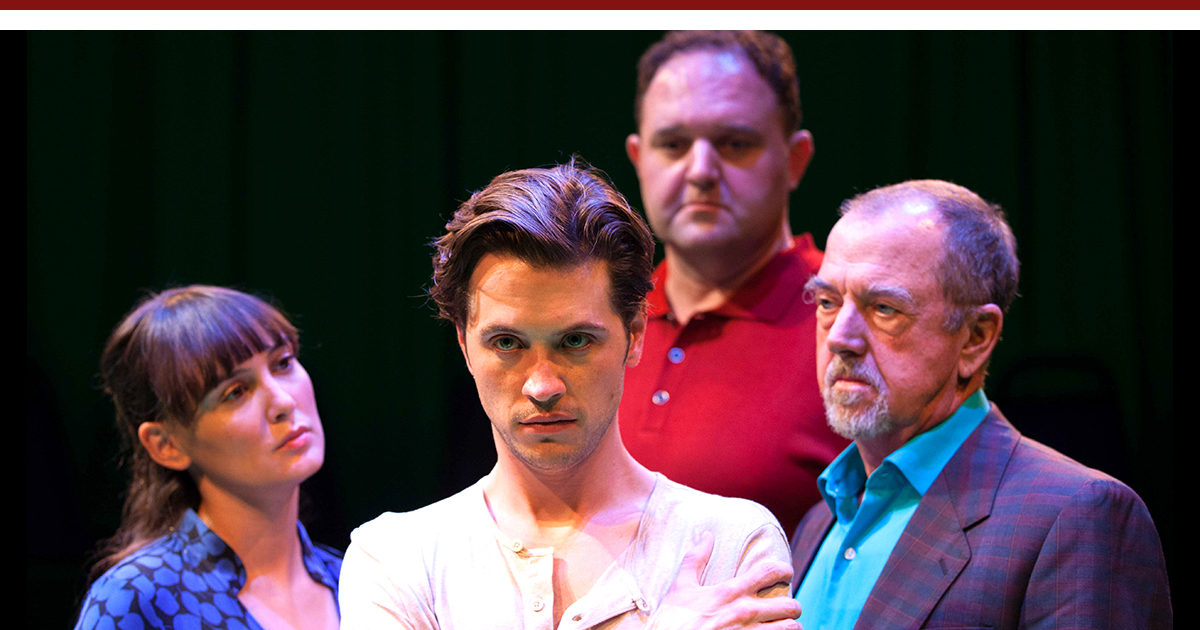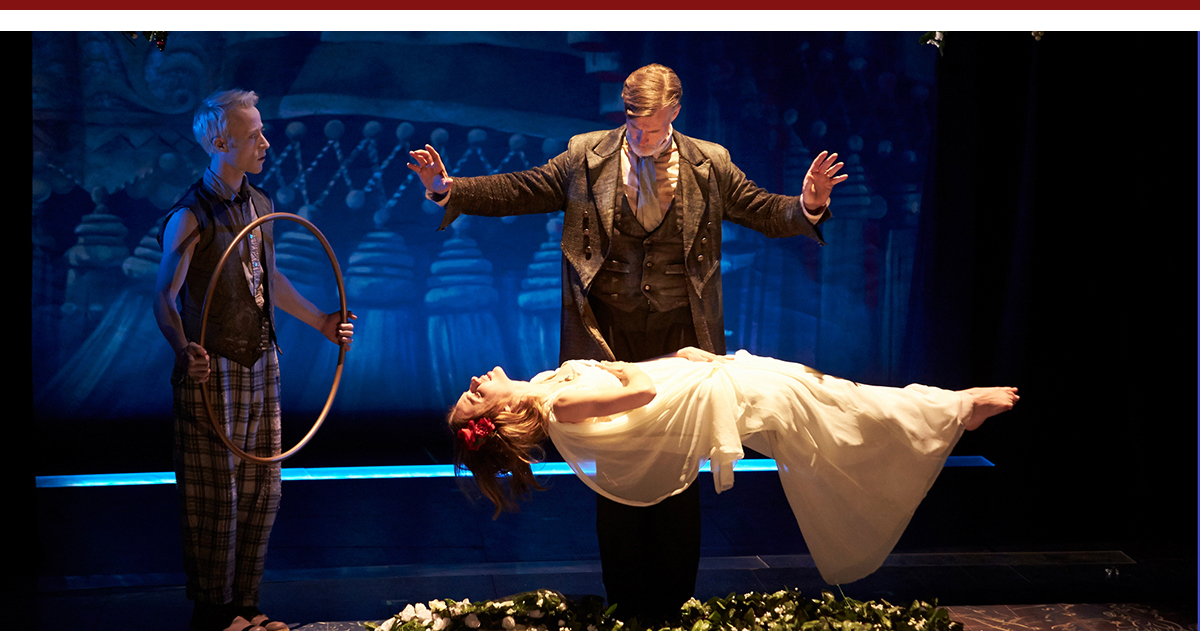SEPTEMBER 2014
Click title to jump to review
COCK by Mike Bartlett | Rogue Machine Theatre
RACE by David Mamet | Kirk Douglas Theatre
THE TEMPEST by Shakespeare, adapted by Aaron Posner and Teller | South Coast Repertory

’There's only room for one …’
As boundaries of sexual identity fall, or are yanked down like Berlin Walls, there will be some who find themselves wandering a vast new landscape of indecision. Playwright Mike Bartlett offers a prototype in John, the central character in Cock, a 2009 play from Britain now receiving its Los Angeles Premiere at Rogue Machine Theatre.
Directed by Cameron Watson, fresh from staging Caryl Churchill's Top Girls, a visionary British play from 30 years ago, this one-act, 90-minute drama's scenes proceed like boxing rounds. There are no corners for between-round retreats on Stephen Gifford's intimate circular set, however. Instead, characters circle each other under briefly dimmed lights before hitting the next marks and continuing. The bare stage and the three rows of seats that wrap around it, not much bigger than a roomy sauna, are painted Halloween candy-bucket green.
The match is between a triangle of conflicted lovers. The blows they land aren't physical –or sexual – but psychological and intensely emotional. Though they often stand inches apart there is virtually no touching, making the misleadingly explicit title a red herring. The only time "cock" comes up, as part of "cock up," it's a wistful reference to erring.
In an award-worthy performance by Patrick Stafford, John is a different kind of protagonist. Underscoring John's pivotal position, the other characters are merely labeled, like single-lettered lavatory doors: "W," is played by the bankable Rebecca Mozo; Matthew Elkins, Rogue's Producing Director, is "M," and "M's" father, "F," is played by Gregory Itzin.
Gay from the get-go, John came out at school and connected with the older "M" at age 22. Now approaching 30, his love for "M" is overshadowed by a growing fear he is being smothered by the older man. In the first scene "M" clearly has it both ways. The inflated self-image that keeps his mildly superior airs pumped up, is dependent on the handsome young partner he condescendingly patronizes. John's request for time apart wounds "M," who brashly banishes him to the living room couch. It's a move he soon regrets and tries to undo.
There's nothing so far that doesn't happen in rocky relationships of every sexual variety. The twist comes when after months of occasional eye contact with "W," a fellow commuter. Perhaps because John is clearly troubled, she breaks the ice. The fact that John is the rare single man of age who doesn't hit on her allows the conversation to proceed easily and they agree to meet for coffee, then dinner, and within two weeks of John moving to the couch, he is in her bedroom.
Now even more confused, John hopes to get objective guidance from "M," though he downplays "W's" sex appeal. Telling both lovers he has decided to drop the other, John gets "M" to agree to have "W" over for dinner. For moral support and additional arm-twisting, "M" secretly invites his dad, "F." What John ultimately decides, if anything, must remain a surprise.
If Bartlett cuts any corners, it is that he writes "W" as smart enough to consistently stand up and outmaneuver "M" and "F" at the dinner. And yet, she is absolutely convinced that, despite his being so equivocating – and gay – John is a secure future husband and father for her. Mozo plays it right: clear-eyed and never wavering. Nevertheless, what we learn of her past, and their epiphanic – and still touch-less – lovemaking, may well have convinced her this is the extraordinary connection she hopes.
Elkins gives "M" a fussiness that bristles easily. It seems appropriate for a man whose aging must feel accelerated by the constant presence of someone younger and more energetic. Itzin, the great veteran, though a little wobbly on opening weekend, clearly has the role of protective father down in his bones.
The bonus is seeing Stafford for the first time. His performance is reminiscent of the fighter who seems passive for many rounds before winning with an intense flurry that beings everyone to their feet. Mozo's performance continues a list of demanding lead roles that she has claimed as her own. She can also claim, if she chooses, the distinction of putting a face on the unnamed woman in David Bowie's "Suffragette City," a song that 42 years ago offered an early rock music crossover prototype named Ziggy Stardust.
"Wham, bam, thank you ma'am!"
top of page
COCK
by MIKE BARTLETT
directed by CAMERON WATSON
ROGUE MACHINE THEATRE
September 13, 2014
(Opened 9/5, Rev’d 9/6m)
CAST Matthew Elkins, Gregory Itzin, Rebecca Mozo, Patrick Stafford
PRODUCTION Stephen Gifford, set; Kate Bergh, costumes; Jared A. Sayeg, lights; Christopher Moscatiello, sound; Nike Doukas, dialects; Ramón Valdez, stage management
HISTORY Premiered at the Royal Court Jerwood Theatre Upstairs, November 2009; Los Angeles Premiere produced by John Perrin Flynn, Matthew Elkins, and Laura Hill; Justin Okin, associate producer
Rebecca Mozo, Patrick Stafford, Matthew Elkins, and Gregory Itzin
John Flynn
Race to the finish
David Mamet is firing on all cylinders in Race, his 2009 play now receiving its Los Angeles premiere at the Kirk Douglas Theatre (through September 28). Race relations may be the third rail of American politics, but it has energized Mamet, who jumps into the track bed and dances along that rail to power this sizzling polemic. While the effect is more adversarial than articulate, it is the most exciting and successful effort by him that I have seen in years.
In Scott Zigler's taut staging, the neutral-toned walls of Jeffrey P. Eisenmann's conference room set are broken by dark vertical bars that suggest even the high-powered defense attorneys who run this law office are confined by convention. They also signal we're in for some good ol' Mamet cage combat. Attorneys Jack Lawson (Chris Bauer) and Henry Brown (Dominic Hoffman) are interviewing a potential client, Charles Strickland (Jonno Roberts), as Susan (DeWanda Wise), one of the firm's newest lawyers, listens from a corner, her laptop ready.
Strickland is wealthy, white, and sufficiently high-profile to warrant front-page coverage of an African American woman's charge that he raped her in a hotel room. Statistics say he's guilty. Circumstances, however, are murky enough and Strickland's success and celebrity viable enough that, as he seems to suggest, this may be a case of justice-system extortion. Also, the woman was apparently his mistress, and so this may be the furious result of a woman scorned or simply fed up. In any case, in Mamet's world you can't take anyone at his or her word. The facts that eek out like raw crude only muddy the waters further. Lawson and Brown weigh them, not to determine Strickland's guilt but to figure a way to get him off. Legal maneuvering and how it makes the concept of justice meaningless emerge as equal targets for Mamet's play.
After interviewing with another firm that passed on the case, Strickland hopes the racially mixed Brown and Lawson team will somehow provide non-racist seal of approval. However, while Brown and Lawson are black and white, there is nothing clear-cut about Strickland's case. We are intentionally left unsure about his guilt throughout the 110-minute, two-act play. Unlike the men, Susan is young and unjaded. She is also black and female. While she exhibits the shark instincts that her mentors demand of employees the hotel room victim cannot be left faceless. Ultimately, it may be her pivotal perspective and intuition that trump her elders' wealth of experience.
In an interview earlier this year, Mamet mocked ongoing calls for a "dialogue on race." "We’ve been having one continuous dialogue on race for my entire lifetime, and it only worsens and widens the divide," he told The Federalist's David Masciotra. In keeping, Race stirs polarized debate more than stimulating productive dialogue. The characters spout and accept half-baked stereotypes about race relations: All whites feel guilt and all blacks feel shame; all whites are suspicious of all blacks and will take advantage of them at any opportunity, all blacks secretly hate whites. While it helps turn the heat to boil, it pretty much eliminates useful takeaway.
The Mamet-meter that propels the dialogue is less pronounced than in the early plays that boosted him to the front ranks of playwrights: American Buffalo, the Pulitzer Prize-winning Glengarry Glen Ross, and others including Speed-the-Plow, which is vaguely echoed in employer-employee dynamic here. Zigler's actors have different comfort levels with the heightened style.
Not surprisingly, Hoffman, a Mamet veteran, is best at humanizing the speech and making Brown the most believable presence on stage. Roberts successfully makes the intentionally enigmatic Strickland a blank slate. For Wise especially, and Bauer to a lesser degree, the effort to clip the dialogue rhythms only flattens it. Nevertheless, the actors are excellent and all the piercing, scathing humor and insight are intact, making this an embraceable theatrical treat.
Leah Piehl designed the costumes, which are men's suits and Ms. Wise's simple blouse and skirt office wear. The lights are by Josh Epstein.
Race, rape, and backroom legal wrangling should keep this one of Mamet's most-produced works. Certainly some backroom legal wrangling was involved in the play taking five years to reach Los Angeles.
top of page
RACE
by DAVID MAMET
directed by SCOTT ZIGLER
KIRK DOUGLAS THEATRE
August 31-September 28, 2014
(Opened 9/6, Rev’d 9/12)
CAST Chris Bauer, Dominic Hoffman, Jonno Roberts, DeWanda Wise
PRODUCTION Jeffery P. Eisenmann, set; Leah Piehl, costumes; Josh Epstein, lights; Kirsten Parker/Michael Vitale/Brooke Baldwin, stage management
HISTORY Premiered on Broadway in 2009
Dominic Hoffman and DeWanda Wise
Craig Schwartz
No illusion
The new adaptation of Shakespeare's The Tempest by Aaron Posner and Teller, of the comedy-magic duo Penn & Teller, turns the play's central character into a magician who levitates his daughter, makes things appear and disappear, and along with his assistant Ariel performs tricks that would earn them both Magic Castle membership. The West Coast premiere, at South Coast Repertory (through September 28), is the third leg of a co-production that already sold out extended runs in Las Vegas and Boston.
The greater sorcery is how the co-adapters, who also co-direct, blend contributions from some of the most iconic figures in music, movement, and magic while simultaneously overlaying the world of an itinerant magic tent show into the play's island setting. Performed in a tent for the April world premiere at the Smith Center in Las Vegas, that additional environmental element has been abandoned for practicality.
It was years ago that the magician in Teller saw the magician in Prospero, the central character in this final play by Shakespeare. Years of obsessively studying magic had distracted Prospero from his treacherous brother's plan to usurp and set him and his daughter Miranda adrift in a damaged boat to die on the sea. After they landed on a barren island, Prospero (Tom Nelis) continued to develop his magic. He discovered a sprite named Ariel (Nate Denby), who had been trapped in a tree by the witch who once controlled the island. He freed Ariel on the condition that his far greater powers were now used only at Prospero's command. Prospero also enslaved the monstrous Caliban (Zach Eisenstat and Manelich Minniefee), the other local. As the witch's half-human offspring, Caliban sees himself as the island's true governor and harbors a smoldering lust to make Miranda (Charlotte Graham), now a 15-year-old on the verge of independence, his queen.
It was the story of the widowed Harry Willard and his Willard the Wizard show that gave Teller the theme for this Tempest. Willard toured America in the mid-20th Century, performing in a large tent with his daughter and a band called Spirit Cabinet. A photo of Willard's "rail-thin" musicians was all Tom Waits and Kathleen Brennan needed to throw open their music catalog for the adapters.
The challenge of creating a Caliban that was monstrous, magical, and totally new went to Pilobolus Dance Troupe's Matt Kent. He has conceived a two-man Caliban that tumbles as one, rides on one another's hip, and cower, threaten and deliver lines in unison. It is an otherworldly solution, at once beautiful and hideous. To increase Teller's magic they enlisted magician's magician Johnny Thompson as Magic Designer, and brought in Thom Rubino for "magic engineering and construction."
The production's magic is sufficient to drop jaws and earn applause numerous times without cracking the theatrical conceit and continuity. It begins in pre-show, when Ariel, a deadpan Albino dressed by designer Paloma Young in vest and checked pants that are clearly hand-me-downs or washed-ashores from someone, performs card tricks with the audience. He exits into Daniel Conway's set, which roughly combines a ship's quarter deck with a curtained stage, as the cast takes their places. Designer Christopher Akerlind provides cues with the consistent amber glow of candlelight. Strands of dying lights from an abandoned midway droop from poles with one circle of them pulsing around a suspended rim that recalls a Medieval breaking wheel and reminds of the play's underlying theme of retribution.
Prospero and Ariel get the play started by whipping the seas into a tempest, which tosses the passengers from a passing boat into the sea and onto the island. They include Prospero's brother, Antonio (Louis Butelli), King Alonso (Mike McShane), Alonzo's son Ferdinand (Joby Earle) and brother Sebastian (Edmund Lewis), a trustworthy noblewoman named Gonzala (Dawn Didawick), and two court musicians, Stephano (Eric Hissom) and Trinculo (Jonathan M. Kim). Over the two acts and two-plus hours, Prospero will demonstrate total control over his former kinsmen until he reveals that he is alive and reclaims his seat. In an act of forgiveness that parallels his letting go of his daughter, he drops his plan to avenge his brother's act. The amount of time Shakespeare dedicates to the off-Islanders has been cut. The wonderful interplay of Hissom's Stephano and Kim's Trinculo with the double-appendaged Caliban leaves us wanting more rather than the usual results.
Waits and Brennan's songs breathe freely in this blended atmosphere. The four-piece band, with the show name Rough Magic, remain on the second floor poop deck area. When not performing, they watch the action below. The script indicates that vocalists Liz Filios and Miche Braden (also Music Director) at times are the play's Juno and Iris goddesses. They also play conventional and unconventional instruments (Kenny Wollesen is credited with instrument design and Wollesonics) with Joel Davel, the principal percussionist, and Matt Spencer, primary standup bassist. Like the magic tricks, the songs are abundant and satisfying without over-encroaching. They include the opening "Everything You Can Think," from Alice; "Dirt in the Ground" from Bone Machine; "Little Drop of Poison" from The End of Violence soundtrack; "I'll Shoot the Moon" from Black Rider; "God's Away on Business" from Blood Money, the second act opening "Clap Hands" from Rain Dogs; "Shiny Things" from Orphans; "No One Knows I'm Gone," also from Alice, and "Innocent When you Dream" from Frank's Wild Years.
Among the many victories for the adapters is the genuineness of the romance between Miranda and Fernando, which is enhanced by its stark contrast to all the illusion and duplicity that surrounds them. Their meeting, courtship and marriage ceremony are blessed by Prospero and, though not referenced in the show or program but intended by the script, embued by the divine voices of Filios and Braden's goddesses. Watch Graham's gobsmacked girl and Earle's flustered Fernando, I heard the show's opening song lyric, "Everything you can think is true." Their innocence and honesty have allowed something truly enchanting to become true, in the way same way Posner and Teller's hard work have realized their dream.
To bring it home, they insert their show-stopping levitation trick into he wedding ceremony. With Filios delivering a beautiful rendition of "Shiny Things," a different kind of ring ceremony takes place. As Prospero slides his magician's hoop over the airborne Miranda to prove there are no strings used in the illusion, he has also cutt the apron strings that bound her to him.
top of page
THE TEMPEST
by WILLIAM SHAKESPEARE
adapted and directed by
AARON POSNER and TELLER
songs by TOM WAITS
and KATHLEEN BRENNAN
musical direction by MICHE BRADEN
choreography by MATT KENT
SOUTH COAST REPERTORY
August 29-September 28, 2014
(Opened 9/5, Rev’d 9/6m)
CAST Louis Butelli, Nate Dendy, Dawn Didawick, Joby Earle, Zach Eisenstat, Edmund Lewis, Mike McShane, Manelich Minniefee, Tom Nelis, Charlotte Graham, Liz Filios, Joel Davel, Matt Spencer and Miche Braden
PRODUCTION Daniel Conway, set; Paloma Young, costumes; Christopher Akerlind, lights; Charles Coes and Darron L West, sound; Johnny Thompson, magic design; Thom Rubino, magic engineering and construction; Kenny Wollesen, instrument design and Wollesonics; Katie Ailinger, stage management



